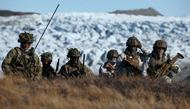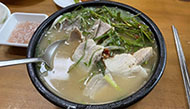CHARLOTTESVILLE, Virginia - The call to forge deeper connections with the food we eat has drawn thousands to farmers’ markets, sprouted a million backyard seedlings and stimulated fresh interest in canning, baking from scratch and other pursuits from an older time.
Now add hunting to the list. Novice urban hunters are forming classes and clubs to learn skills that a few generations ago were often passed down from parent to child.
Jackson Landers, an insurance broker, teaches a course here called Deer Hunting for Locavores. Mr. Landers, 31, started the classes this year for largely urban adults who, like him, did not grow up stalking prey but have gravitated to harvesting and cooking their own game.
Jackson Landers prepares a meal from fresh deer meat. / JAY PAUL FOR THE NEW YORK TIMES
He teaches deer biology, habitat and anatomy, and rounds out his students’ education with field trips to a firing range to practice shooting and a session on butchery and cooking. One of the last lessons covered field dressing a freshly killed deer. As the students gathered around, Mr. Landers produced a hunting knife and explained its gut-hook feature, which promised to open the deer “like a zipper.”
“I’d never fired a gun before,” said Michael Davis, 44, a graphic designer and a student in the class. “I grew up in Southern California. We surfed, we didn’t hunt.”
But Mr. Davis said he needed to understand what it meant to hunt for food. “I think going through my life without at least experiencing that most primal thing of hunting would be cheating,” he said.
It was a taste for wild boar that spurred Nick Zigelbaum, 26, and Nick Chaset, 27, to form the Bull Moose Hunting Society, a hunting and dining club in San Francisco. The society, founded in 2007, was designed to appeal to young urban residents looking to expand their horizons.
The club now has roughly 55 duespaying members, many of them in their 20s and 30s, who hunt for boar, pheasant and waterfowl together. They share the spoils in the field .
Across the United States, the number of hunters has been in decline for decades. The shift from rural to urban life is the main reason, said Mark Damian Duda, executive director of Responsive Management, a research firm that specializes in natural resources and outdoor recreation issues.
According to his firm’s research, only 22 percent of hunters now say they hunt primarily for food. Most say they do so for recreation or to spend time with their families. “Thirty years ago it was about half the hunters who were hunting for food,” Mr. Duda said.
Anthony Licata, the editor of Field & Stream magazine, said he wasn’t surprised that a new generation was discovering what traditional hunters have known all along.
“There’s nothing more organic and free range than meat you hunt for yourself and your family,” he said. “When you do hunt and if you’re lucky enough to fill your freezer with venison and feed your family, it’s a powerful thing. They aren’t going to want to stop.”
Mr. Landers, who tries to take Virginia’s full limit of six deer a year, agreed. For the cost of the necessary licenses, $36.50, he said he can stock his freezer with nearly free protein. He also argued that for the environmentally conscious, hunting is fairly carbon neutral. “If you can shoot a deer in your own backyard, butcher it there, that’s zero food miles,” he said.
A recent convert to hunting, Mr. Landers became interested in wild game a few years ago when he inherited his great-grandfather’s hunting rifle. He read up on deer management, queried his in-laws, many of whom are hunters, and was soon putting venison on the table.
Like many people, he’d become concerned about large-scale agricultural methods, the use of antibiotics in livestock and the ethics of raising animals in tight quarters. Hunting seemed like a good alternative. “I felt bad about meat,” he said, “but not so bad that I was willing to give it up.”
Before founding their hunting club, Mr. Zigelbaum and Mr. Chaset wanted a closer connection with their food, but finding information about hunting in the San Francisco area was daunting.
Mr. Chaset recalled searching for a suitable wild boar hunting weapon at a gun shop in San Francisco. The staff tried to convince him that a pistol would be fine. He left with the shop’s only rifle, which he used to fell his first boar , an experience he described as “an epiphany.”
“I got this strong sensation of the cycle of life,” he said. It didn’t hurt that he thought the taste of the boar was amazing.
Mr. Zigelbaum said wild boar meat, which tends to be darker and denser than domesticated pork, was “lean, but tasted like bacon.” He plans to travel to the south of France, where he hopes to study traditional charcuterie methods. Wild boar prosciutto, he said, would be “awesome.”
deer he shot, helped found a hunting society for urban neophytes. / MICHAEL TEMCHINE FOR THE NEW YORK TIMES
스마터리빙
more [ 건강]
[ 건강]이제 혈관 건강도 챙기자!
[현대해운]우리 눈에 보이지 않기 때문에 혈관 건강을 챙기는 것은 결코 쉽지 않은데요. 여러분은 혈관 건강을 유지하기 위해 어떤 노력을 하시나요?
 [ 건강]
[ 건강]내 몸이 건강해지는 과일궁합
 [ 라이프]
[ 라이프]벌레야 물럿거라! 천연 해충제 만들기
 [ 건강]
[ 건강]혈압 낮추는데 좋은 식품
[현대해운]혈관 건강은 주로 노화가 진행되면서 지켜야 할 문제라고 인식되어 왔습니다. 최근 생활 패턴과 식생활의 변화로 혈관의 노화 진행이 빨라지고
사람·사람들
more
[한인단체 신년 인터뷰] 명원식 파바월드 회장… “한인 차세대 바르게 성장하는 토대 최선”
“한인 차세대들이 바르게 자랄 수 있는 토대를 만드는 것이 제가 파바월드의 회장으로 존재하는 유일한 이유입니다”한인사회의 대표적 청소년 봉사 …

LA한인회 멘토 프로그램 10일 스티브 강 위원장
LA 한인회(회장 로버트 안)가 한인사회 차세대 인재양성 노력의 하나로 ‘멘토를 만나다’ 프로그램을 정례화해 실시하고 있는 가운데 그 세 번째…
미주 한인의 날 기념… 잇달아 ‘코리안 나잇’
미주 한인들의 역사와 성취, 그리고 미국 사회에 기여해 온 발자취를 기리는 1월13일 ‘미주 한인의 날’을 맞아 LA의 주요 프로 스포츠 구단…
‘K-팝의 미래’ 세미나 16일 LA 문화원 개최
LA 한국문화원(원장 이해돈)은 세계한류학회(WAHS)와 함께 오는 1월16일(금) ‘케이팝 데몬 헌터스와 케이팝의 미래 세미나 및 라운드테이…
[한인단체 신년 인터뷰] LA 한인회 로버트 안 …
“더욱 적극적이고 실질적인 서비스로 한인들의 어려움을 돕고, 한인사회 발전에 앞장서겠습니다.”2026년 병오년 새해를 맞아 LA 한인회 로버트…
많이 본 기사
- 일자리 위협하는 AI, 전문직도 대체한다… 컴퓨터 전공·로스쿨 졸업생들도 ‘취업난’ 극심
- ‘비자 보증금’ 대상 확대… 최대 1만5천달러 내야
- 첨단기술 ‘CES 2026’ 개막… 행사장에 몰린 구름 관람객
- ‘불륜 논란’ 숙행, 15일 상간녀 ‘위자료 1억’ 소송 선고
- 손담비, 시동생 성폭행 ‘악플 소송’ 냈다.. “50만원 배상하라”
- ‘전반 슈팅 1개’ 한국 U23, 이란과 0-0 무승부... 아시안컵 첫판부터 ‘흔들’
- “숫자 다루는 직업이지만 사람간 소통 · 신뢰가 먼저죠”
- “예년보다 빠르고 거세다”
- 與원내대표 후보들 김병기 거취 온도차… “선당후사” · “소명기회”
- 李대통령, 서울 도착…방중 성과 살리고 국내 현안 점검 나서(종합)
- 張, ‘계엄사과·과거결별’로 돌파 시도…계파갈등 ‘뇌관’ 여전
- 연방대법 9일 중대 판결 “상호관세 결정 가능성”
- ‘마구잡이 이민단속’ 제한 법안 속속 진전
- “다저스가 기대한 그대로” 반쪽짜리였던 김혜성, 美 매체가 호평한 이유
- 뉴욕시 ‘숨은 수수료’ 퇴출 나섰다 1
- “사면 감사합니다. MAGA는 영원하다”
- 내란특검, 尹구형 앞두고 공소장 변경…계엄모의 2023년 10월로
- 뉴욕한인회 음갑선 수석부회장 인준
- 아시안유권자연맹, 그레이스 멩 공식 지지
- 메디케어 보험 가입 마감 31일까지 연장
- [신년 집중기획/ 한인 정치력 신장 원년으로] 중간선거의 해… “투표 통해 한인 공직자 늘려야”
- 컴퓨터 전공·로스쿨 졸업생들도‘취업난’극심
- 차세대 리더 양성 위한 협력 강화
- ‘콜록콜록’ …워싱턴 독감환자 폭증
- “조폭 해외 도피→조세호 복귀”..폭로자, 분노 못 참고 또 글 올렸다
- “2026년도 힘찬 활동”… LA 평통 시무식
- ‘주사 이모’ 집 털렸다..박나래, 19금 행위 폭로→경찰 소환까지 ‘첩첩산중’
- 조국사랑미주연합 · 한미충효회, 제9회 신년하례 초청모임
- 한인타운 노래방 협회 발족한다
- “유튜버 될 수 있어요” 무료 특강
- 태권도·한국문화 공로자에 표창
- 마크 레빈 뉴욕시 감사원장 취임식
- 서울고 총동창회 홍희경 전 회장에 감사패
- 순회영사, 10일 커뮤니티센터서
- GCF 워싱턴, 신임회장 김신아 호(號) 출범
- 마두로 사태 ‘중남미 최정예’ 쿠바 굴욕
- VA 재무차관에 한인 제임스 허
- LAX 진입로 혼잡 극심 이번주 시설철거 공사
- 레이건 前대통령 장남 마이클 레이건 별세… “부친 유산지킨 수호자”
- 모어 MD 주지사, 한인 등 아태계 기금모금 행사
- 공영방송공사 결국 해산 트럼프 예산중단에 백기
- ‘전혜진 남편’ 故 이선균 묘비에 새긴 절절 고백.. ‘사랑해’
- 17년 만에 지상파 3사 다 뚫었다..김준수, SBS ‘미우새’ 출격
- 르세라핌 ‘SPAGHETTI’, 빌보드·스포티파이 차트 ‘동시 역주행’
- 노키아의 ‘피벗 DNA’… 몰락했던 휴대폰 거인, 엔비디아 손잡고 부활 신호탄 쏜다
- ‘윌셔·버몬트’ 메트로역 폭발물 의심물체 소동
- 다우, 첫 49,000 돌파 증시 연초 랠리 지속
- 40명 사망 스위스 술집, 6년간 소방점검 없었다
- [마크 A. 시쎈 칼럼] 트럼프의 20가지 업적
- 케네디에 관한 네 개의 이야기
1/5지식톡

-
 미 육군 사관학교 West Poin…
0
미 육군 사관학교 West Poin…
0https://youtu.be/SxD8cEhNV6Q연락처:wpkapca@gmail.comJohn Choi: 714-716-6414West Point 합격증을 받으셨나요?미 육군사관학교 West Point 학부모 모…
-
 ☝️해외에서도 가능한 한국어 선생님…
0
☝️해외에서도 가능한 한국어 선생님…
0이 영상 하나면 충분합니다!♥️상담신청문의♥️☝️ 문의 폭주로 '선착순 상담'만 진행합니다.☎️ : 02-6213-9094✨카카오톡ID : @GOODEDU77 (@골뱅이 꼭 붙여주셔야합니다…
-
 테슬라 자동차 시트커버 장착
0
테슬라 자동차 시트커버 장착
0테슬라 시트커버, 사놓고 아직 못 씌우셨죠?장착이 생각보다 쉽지 않습니다.20년 경력 전문가에게 맡기세요 — 깔끔하고 딱 맞게 장착해드립니다!장착비용:앞좌석: $40뒷좌석: $60앞·뒷좌석 …
-
 식당용 부탄가스
0
식당용 부탄가스
0식당용 부탄가스 홀세일 합니다 로스앤젤레스 다운타운 픽업 가능 안녕 하세요?강아지 & 고양이 모든 애완동물 / 반려동물 식품 & 모든 애완동물/반려동물 관련 제품들 전문적으로 홀세일/취급하는 회사 입니다 100% …
-
 ACSL 국제 컴퓨터 과학 대회, …
0
ACSL 국제 컴퓨터 과학 대회, …
0웹사이트 : www.eduspot.co.kr 카카오톡 상담하기 : https://pf.kakao.com/_BEQWxb블로그 : https://blog.naver.com/eduspotmain안녕하세요, 에듀스팟입니다…
케이타운 1번가
오피니언
 정숙희 논설위원
정숙희 논설위원케네디에 관한 네 개의 이야기
 마크 A. 시쎈 / 워싱턴포스트 칼럼니스트
마크 A. 시쎈 / 워싱턴포스트 칼럼니스트 [마크 A. 시쎈 칼럼] 트럼프의 20가지 업적
 김동찬 시민참여센터 대표
김동찬 시민참여센터 대표 [미국은 지금] 2026년 ‘손님’ 의식 버리고 ‘주인’ 입장을
 이현숙 수필문학가협회 이사장
이현숙 수필문학가협회 이사장 [수요 에세이] 이젠 끝이다 “Nevermore, Nevermore”
 최형욱 / 서울경제 논설위원
최형욱 / 서울경제 논설위원 [만화경] ‘가짜 일’ 줄이기
 민경훈 논설위원
민경훈 논설위원도널드 W 부시와 이라크 전의 추억
 황의경 사회부 기자
황의경 사회부 기자 타국에서, 다시 ‘우리’를 생각하다
 박원곤 이화여대 북한학과 교수
박원곤 이화여대 북한학과 교수 [백상논단] 붉은 말의 해, 한반도에 다시 오는 분기점
 홍용희 수필가
홍용희 수필가 [화요칼럼] 내 안의 바위
1/3지사별 뉴스

뉴욕시 ‘숨은 수수료’ 퇴출 나섰다
뉴욕시가 일반 소비 시장에 만연해 있는 ‘숨은 수수료’(Junk fee) 근절에 나섰다. 조란 맘다니 뉴욕시장은 5일 ‘숨은 수수료’ 및 ‘…
‘마구잡이 이민단속’ 제한 법안 속속 진전

VA 재무차관에 한인 제임스 허
30대 중반의 한인 제임스 허 씨(사진)가 버지니아 재무차관(Deputy Secretary of Finance)에 내정됐다. 아비가일 스팬버거…
‘콜록콜록’ …워싱턴 독감환자 폭증

‘안면 인식’으로 불체자 확인·체포한다
트럼프 행정부의 초강경 이민 단속 기조 속에 불법체류자 단속을 위해 안면 인식 기술이 본격적으로 활용되고 있어 논란이 커지고 있다. 4일 월스…
중부 캘리포니아 ‘한인 이민사’ 나왔다





















































.png)


댓글 안에 당신의 성숙함도 담아 주세요.
'오늘의 한마디'는 기사에 대하여 자신의 생각을 말하고 남의 생각을 들으며 서로 다양한 의견을 나누는 공간입니다. 그러나 간혹 불건전한 내용을 올리시는 분들이 계셔서 건전한 인터넷문화 정착을 위해 아래와 같은 운영원칙을 적용합니다.
자체 모니터링을 통해 아래에 해당하는 내용이 포함된 댓글이 발견되면 예고없이 삭제 조치를 하겠습니다.
불건전한 댓글을 올리거나, 이름에 비속어 및 상대방의 불쾌감을 주는 단어를 사용, 유명인 또는 특정 일반인을 사칭하는 경우 이용에 대한 차단 제재를 받을 수 있습니다. 차단될 경우, 일주일간 댓글을 달수 없게 됩니다.
명예훼손, 개인정보 유출, 욕설 등 법률에 위반되는 댓글은 관계 법령에 의거 민형사상 처벌을 받을 수 있으니 이용에 주의를 부탁드립니다.
Close
x